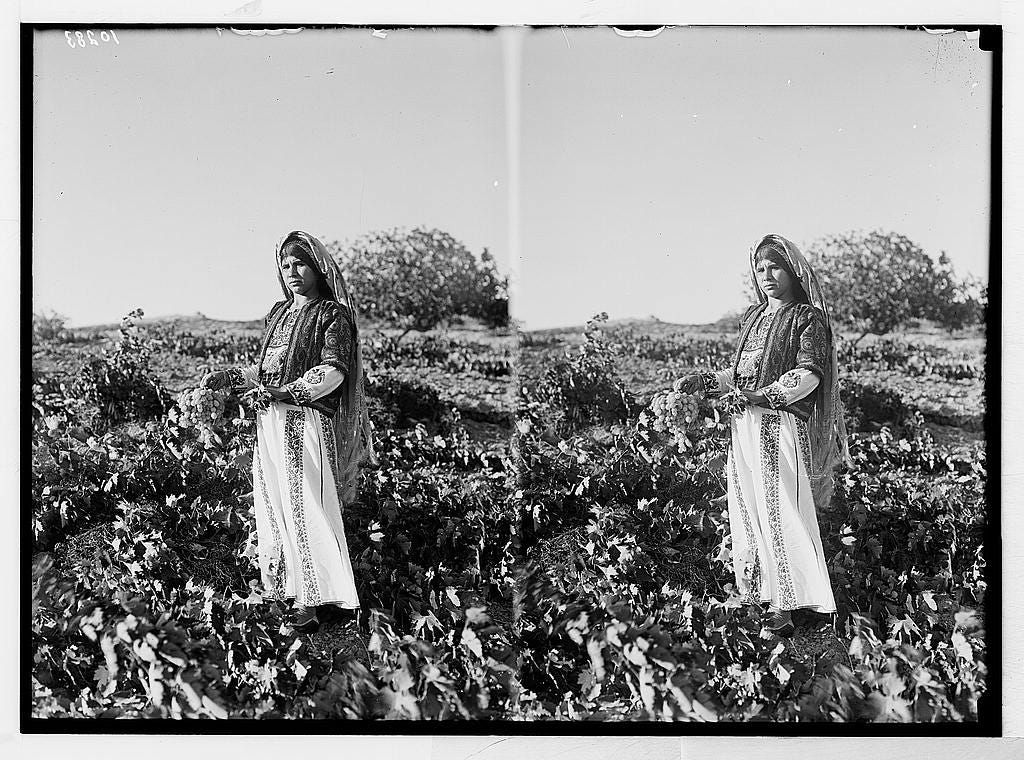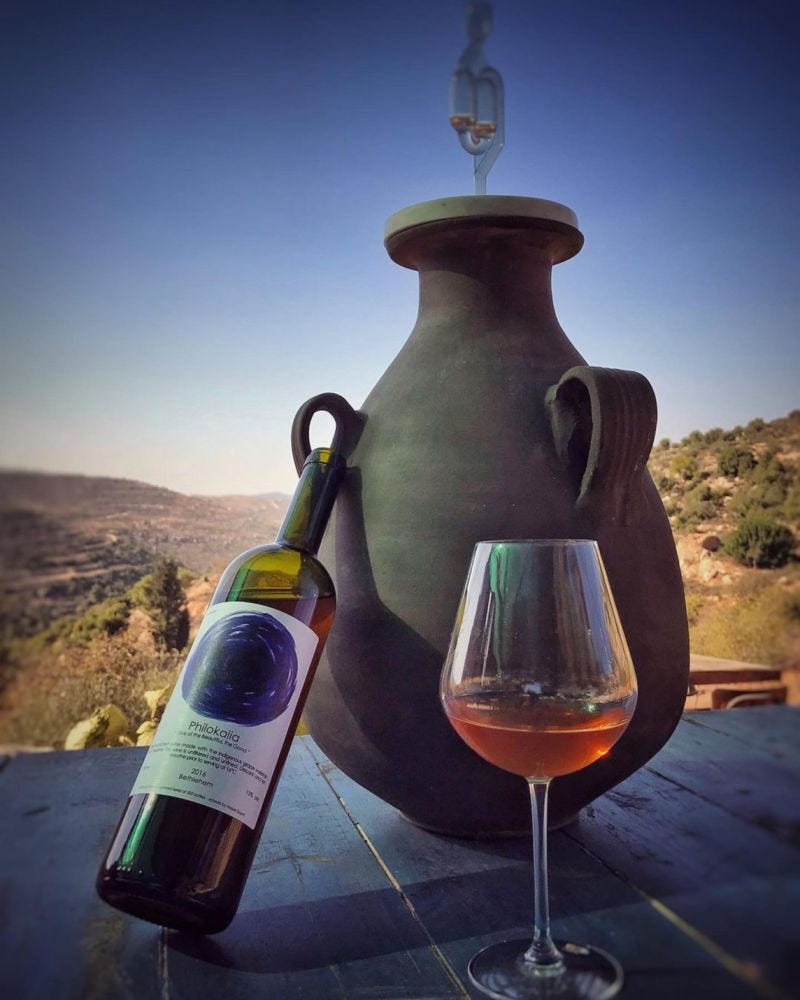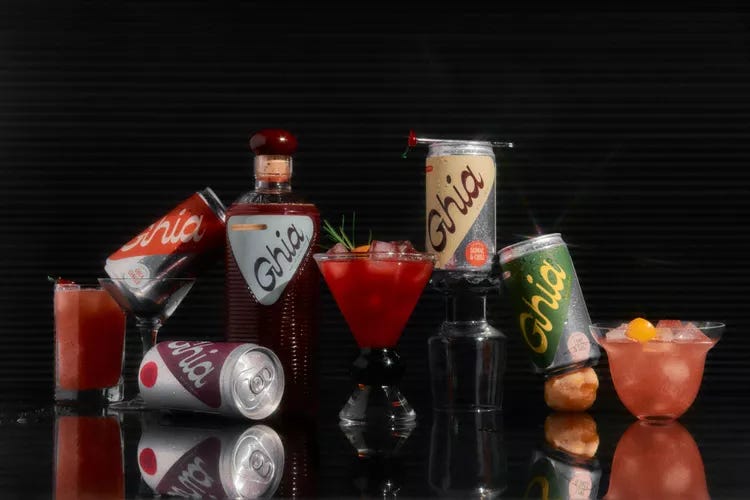Fires Everywhere
Gaza, Palestinian Wines, Table Manners, Unionizing bars, Raging at Recipes, Ethical Mezcal Business, and more!
Hello,
Thanks for reading another edition of drink seco. This week I thought I’d start things a little differently before getting into the usual food/wine discussions.
As I sit in the the safety and comfort of my home writing about cocktails and food it seems impossible not to address the awful elephant in the room, Palestinian civilians are being murdered by the tens of thousands.
It’s now been over 6 months since Israel’s brutal assault on Gaza. Over 34,000 Palestinians have been killed in Israeli attacks and over 75,815 have been injured. Over 14,000 of the 33,000 murdured were children. An estimated 75% of the population have been internally displaced, many of whom have been displaced multiple times. 1,139 Israelis have also been killed. Nearly all 2.3 million people trapped in Gaza now face starvation and Israel shows no sign of stopping, as its allies continue to provide it with more weapons to use on Palestinians along with political support, and mediated talks have not led to a ceasefire.”1
“What is happening in Gaza is not only Israel’s war: it is a US war, and it is most particularly Biden’s war. Israel simply could not afford to carry out this prolonged and resource-intensive assault on the Palestinian people without US money and weaponry.”2
Francesca Albanese, the UN Special Rapporteur on Human Rights in Palestine published her report a few weeks ago confirming with international law, what many have already been saying; That Israel is committing genocide. You can read her official report Anatomy of a Genocide here.
I’d also recommend this piece/conversation Witnessing Future Violence- On Images from Gaza: A Conversation with Dr Jennifer Good about the complexities of the way we are witnessing and consuming this violence.
“Watching on our phones, from our normal, boring, blessed lives, we feel helpless; our ability to meaningfully change anything is limited by our ineffectual governments; and the images keep coming. They demand our attention. And so — what next?”
We have a responsibility not to disengage, to continue to listen to the activists, and to do our part to change US policy and stop the supply of US weapons to Israel. “Polling shows that a majority of Americans want a permanent ceasefire; Biden’s support for Israel even appears to be damaging his chances in the upcoming presidential race. And yet he’s refusing to listen to his voters, and has repeatedly bypassed Congress, in order to keep supplying Israel with the resources on which it relies.” 3
If you can donate, protest, pressure your politicians, promote Palestinian voices and news, anything you can do to help, now is the time.
This newsletter:
Hospitality for Humanity
Crafting Palestinian Wines
Small Fires: An Epic in the Kitchen
Why People Rage at Recipes
Why is it so hard to unionize a bar?
The Tricky Business of Ethical Mezcal
A New Wave of Drinks Are Taking on Big Soda
Table Manners
A Wine and Album Pairing
Hospitality for Humanity:
This is an article about queer Palestinian American chef Marcelle G Afram and how they’re organizing for Palestine. Afram with other fellow Palestinian chefs launched Hospitality for Humanity. They also co-authored a pledge for food and hospitality industry workers to publicly demand a ceasefire and to support the boycott, divestment, and sanctions (BDS) movement and created a digital toolkit to compile action items and provide education on Israel’s weaponization of food and hunger against Palestinians.
You can read more about Afram, their work, and their queer experience here.
Crafting Palestinian Wines:

I read this really interesting interview about Palestinian wines in MOLD Magazine about Philokalia, a design and wine project established in 2015 by Sari Khoury in Bethlehem focusing on Indigenous Palestinian grape varietals.
“Provocative, in the wine and winemaking process and expression of the compromise, oppression, and traditional and ecological realities of occupied Palestine alongside a deep historical consideration of the region. The region is one of the oldest wine producing regions on the planet with a profound and nuanced history of agriculture, tourism, and religion.”
“We’re not leaving enough space to consider the original innovation. And I try to tap into that mindset that went into wine and went into the domestication of certain plants. I ask farmers, You’ve been planting grapes for so many thousands of years. But you’ve only had pesticide for fifty years in the West Bank since 1967, essentially. And so what were you doing for, you know, all these thousands of years minus fifty? And they start to show me some wild plants that they infuse in water and spray the plants with. Those have potential for the highest organic standard in the world for grapevine treatment. And then you’re struck by the sense of observation, that somebody was able to spot something in the environment that can be a tool to treat a difficulty and another aspect in that same environment, through observation, through experimentation, through exploration. That is that spirit of genius that was part of the tradition, obviously, because there’s evidence of it, and that is being lost. So I think I want to reinstate that as part of the tradition.”
An interesting read, and wine history I’ll read up on. But, for now, it’s hard to think about the future of wine when you’re fighting for your existence.

Small Fires: An Epic in the Kitchen:
Why do we cook? Is it just to feed ourselves and others? Or is there something more revolutionary going on?
Small Fires by Rebecca May Johnson shows us the radical potential of the thing we do every day: the power of small fires burning everywhere. Cooking is thinking: about the liberating constraint of tying apron strings; the transformative dynamics of shared meals; the meaning of appetite and bodily pleasure; the wild subversiveness of the recipe, beyond words or control.
“The phrase ‘cooking with love’ is used to avoid thinking about the cook and the specificity of her life.”
Small Fires is a memoir, acute social criticism, and poetic, scholarly, book of food writing quite unlike anything I have ever read. You might know Rebecca May Johnson from her substack magazine Vittles. The book talks about how we diminish the ‘work’, skill, and creativity that goes into cooking when we reduce it to only an ‘act of love’, which it is.
I loved this quote below which seems to capture the complexities and the contradictions particularly women face in the food industry.
“The choice is not between burning down the kitchen or revisiting it in a nostalgic dream-state; that is a false binary. It is bad faith to burn your grandmother’s archive because she wasn’t as free as you.”
I’ve seen some reviews that the writing can be a little pretentious (one Goodreads review said “We get it, you have a PhD”) but overall it was a refreshing reflection on life in the kitchen, and I love memoirs that play with form.
Why People Rage at Recipes:
To flow on from last week’s chat on recipe criticism. I saw this entertaining article in Lithub about the current state of online food discourse.
“I am convinced that if you were to make a topographical map of the internet, it would just be an infinite collection of tiny hills upon which people are willing to die.”
The internet attracts a lot of passionate people… most of them angry and ready to pick a fight. Recipes and food blogs are no different.
As Geraldine DeRuiter writes in her very entertaining article, “When the world is turning into a smoldering uninhabitable rock, and it feels as if you were powerless to stop it, our anger has to go somewhere. Why not unleash it on the people who really deserve it? Those who have committed the unforgivable crime of sharing food recipes for free on the internet.”
Anyways, if you want a chuckle about the people who think Pepsi is a valid substitute to soy sauce and then complain when the recipe doesn’t turn out right, or those diligent enough to follow Ottolenghi’s 40-ingredient recipes where “you have to start making them six months ahead because you have to grow the herbs from scratch or leave your spices out until a full moon and then you have to lure virgins to dance around them” then this article might be worth a read.
Why is it so hard to unionize a bar?
I read this article in Punch Drink the other day. Death & Co.’s New York City bar announced they were unionizing last fall. “But when the time came for the NLRB election in mid-December, the votes weren’t there. Ten of Death & Co.’s 18 workers voted against the union.”
If the vote had succeeded, Death & Co. would’ve made history.
“While there’s been a recent wave of labor organizing in the service industry since the onset of the pandemic, it hasn’t yet reached most bars.”
According to Connor Smith, of Workers Tap, an employee-owned beer bar in Portland, Oregon, some of the things that make it hard for bar staff to unionize include:
High staff turnover, many hospitality workers are drawn to the flexibility of bar work. When people change jobs frequently, it can be hard to get people to come together and unionize to make a change.
The ability to make a lot of tips also complicates the matter
The conditions are “often better than restaurants”. “Bartenders make a base of $16 per hour, and have 401(k)s and health insurance, a rarity in the service industry.”
“Failed unionization efforts, meanwhile, can have a chilling effect. Tim, a Brooklyn bartender who declined to give his last name, says some people in the industry may fear that unionizing is more trouble than it’s worth. “Let’s say you’re pulling $60, $70K as a bartender in your town. If you feel like you’re in a good spot, there is a fear to that change—a fear that you’re not going to be making as much, or that you’re going to lose something,” he says.”
The article is an interesting read, especially since unionizing has been in the spotlight after the past year of SAG-AFTRA strikes.
The Tricky Business of Ethical Mezcal:
Also from Punch Drink this week, the question of creating a new model for bringing the exploited Mexican spirit to market.
Niki Nakazawa and Max Rosenstock, the partners behind Neta, “a small but growing crop of commercializers working with mezcal producers to develop links to larger markets, which can pay fair prices without fundamentally changing the nature or scale of production.”
Neta is a Mexican slang word that can mean “Really?” or “Really!” or if paired with the definite article la “the good stuff”.
“By exposing metropolitan centers and the export market to mezcals from small villages, companies like Neta have helped to make traditional mezcal profitable enough so producers don’t need to shift methods to meet industrial demand, or replace slow-growing crops with more lucrative ones.”
“Like the producers they work with, small commercializers have faced their own set of problems stemming from the recent mezcal boom. Companies that have spent years generating relationships with producers have lost them to newer entrants, who forgo the complex research required to understand the ecological and cultural context of individual communities, and immediately demand quantities that outstrip what ancestral methods can produce.”
Particularly with a history of imperialism and exploitation in the industry, it is important when we’re working with more vulnerable and local producers we are directly engaging with ethical production.
A New Wave of Drinks Are Taking on Big Soda:
In different news, “functional sparkling waters — bubbly cans that tout benefits like mood, energy, hydration, and beauty — have seen 60% year-over-year growth over the same period of time.”
It’s the fastest growing category in beverages and Big Soda is in a crisis.
“Over the last seventeen years, there’s been an extreme drop in pop, with carbonated soft drinks sales declining every year, fueled by price increases (the cost of soda has risen 45% in the last five years), health concerns, and new, more wellness-oriented beverages.”
These new soft drinks are creative and push the boundaries with flavor, moving away from sickly sweet to more unusual bitter, and complex flavor palates. And they’re all the rage. You might remember Gillian Anderson’s brand ‘Arouse’. She’s not the only one.
“Instead of being torchbearers for obesity and tooth decay, new school sodas are aiming to fit into keto diets, solve sleep issues, and soothe gut problems.”
So, are funeral bells ringing for Big Soda? Maybe not yet, but it seems the writing might be on the wall…
Table Manners:
For a fun food-ish recommendation, check out Table Manners with Jessie Ware and Lennie Ware. A hilarious podcast hosted by singer Jessie Ware and her mother. It’s not a traditional podcast, each week Jessie and Lennie invite them into their home and cook a meal for their podcast guest. They discuss all things food, culture, politics, family, and everything in between. The relaxed environment and setup lead to really interesting and unguarded conversations. It truly feels like you’re watching a family Sunday dinner. They’ve had a huge A-list lineup of guests, make sure to check them out to brighten up your day.
I’m still laughing at this clip:
Check out their instagram for a little taste of what you’re in for.
That’s all for this week folks! Thank you very much for reading.

Carlie xx
https://www.aljazeera.com/news/2024/4/7/israels-war-on-gaza-six-relentless-months-of-death-and-destruction
https://www.irishtimes.com/culture/books/2024/03/16/killing-in-gaza-has-been-supported-by-irelands-good-friend-in-the-white-house/
ibid.











